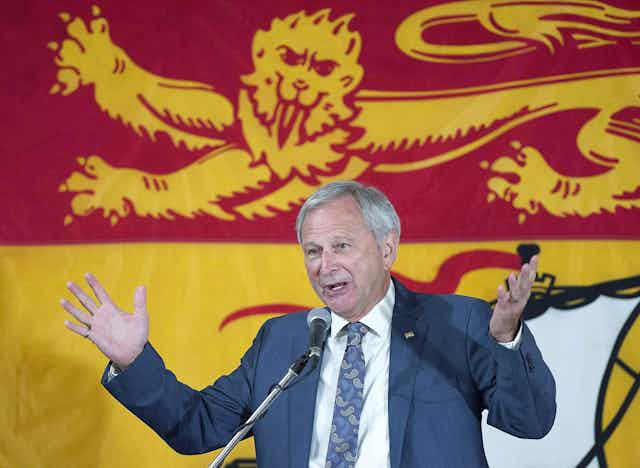The fever pitch of this year’s federal election conjecture and the obsession with the current political chaos in the United States may drown out the tale of government survival in one of Canada’s smallest provinces.
The past few months have been remarkable in New Brunswick politics, filled with foreshadowing of the year to come. On Nov. 30, the Progressive Conservative throne speech was passed by a vote of 25-23 and the government finally won the confidence of the legislature — 67 days after the hotly contested September election.
As with most minority governments in recent memory, the drama did not end on that somewhat anti-climactic confidence vote. What happens now has similarities to some of the most familiar plotlines in Canadian politics.
The 2018 New Brunswick election resulted in the first minority government in the province since 1920. Two minor parties with historic results hold the balance of power (the three Green and three People’s Alliance seats), and the party with the most seats (the PCs) lost the popular vote by five points to the second-place Liberals.
New Brunswick a microcosm
One of Canada’s first four provinces, New Brunswick has traditionally represented a microcosm of Confederation’s linguistic balancing act —and 2019 will find these efforts more politicized than ever.
Since 1960 and the first Acadian Premier Louis Robichaud, the balance has been fragile, often exasperated by the alignment of the two main political parties along linguistic and regional lines.
The Liberal Party is dominant in the mostly French-speaking, northern part of the province, while the Progressive Conservative Party relies on support in the mostly English, southern part of New Brunswick.
Canada’s national language divide has hit a relative lull with the collapse of the Parti Quebecois and the Bloc Quebecois’ efforts to rebuild. But now New Brunswick’s language politics have vaulted ahead of the province’s perpetual focus on its teetering economic crisis to potentially become the central political issue in 2019.
Except for a Liberal victory in Saint John Harbour (city councillor Gerry Lowe won by 11 votes in a result that is currently before the courts), the province is now split along linguistic Liberal and Conservative lines (notwithstanding the insurgent Green Party and People’s Alliance Party’s legislative presence).
For those outside New Brunswick, you are roughly in Liberal country on the Trans-Canada Highway until you pull off to tour the Covered Bridge Chip factory in Hartland (former riding of long-serving Premier Richard Hatfield). Then you enter Tory ridings almost all the way to the Nova Scotia border except for another remarkable development from 2018 — multiple Green ridings, including Memramcook-Tantramar (home to Mount Allison University).
Minority governing
In this dramatically politically divided province, the challenge of governing in a minority situation has been compounded with political pitfalls and policy obstacles at every turn.
Heading into 2019 and the 50th anniversary of official bilingualism in the province, Premier Blaine Higgs faces two major decisions directly related to the language file: Hosting the 2021 Francophonie Games and the staffing of Ambulance NB.
Staffing shortages at Ambulance NB, aggravated by tragic accidents, have been a problem for months and became a key campaign issue, one that galvanized the People’s Alliance and their supporters. At the heart of the controversy is a push for language requirements to take a back seat when it comes to filling paramedic jobs.

Soon after being sworn in, the PC government loosened bilingual hiring requirements in areas of the province where one language was dominant. While briefly placating People’s Alliance leader Kris Austin, the decision almost cost Higgs his deputy premier and lone francophone cabinet minister Robert Gauvin.
News that the budget for the Francophonie Games had ballooned to almost seven times what was initially proposed did not emerge until after the Higgs government was sworn in, and it was a holdover issue from the former Liberal government of Brian Gallant.
Nonetheless, the ongoing issue puts the anglophone premier (and former member of the anti-official bilingualism Confederation of Regions Party) in the position of having to ponder the cancellation of the Francophonie Games to be hosted in Dieppe and Moncton.
Austerity measures
Higgs’ decision will be made in light of a pledge to tighten the province’s purse strings. The government began that process in December, decreasing the previous Liberal government’s capital budget by 30 per cent.
As Higgs deals with the challenges of governing a bilingual province, he also faces the heat of creditors’ threats to lower New Brunswick’s credit rating.
And so as 2019 dawns, Higgs must address economic pressures in the midst of linguistic tensions.
The new premier should not only look to the lessons of his predecessors in the New Brunswick premier’s office, but also to prime ministerial decision-making of the past, when Canada’s leaders confronted myriad language crises amid economic turmoil. It’s not just a New Brunswick tradition, but a well-established Canadian one.

